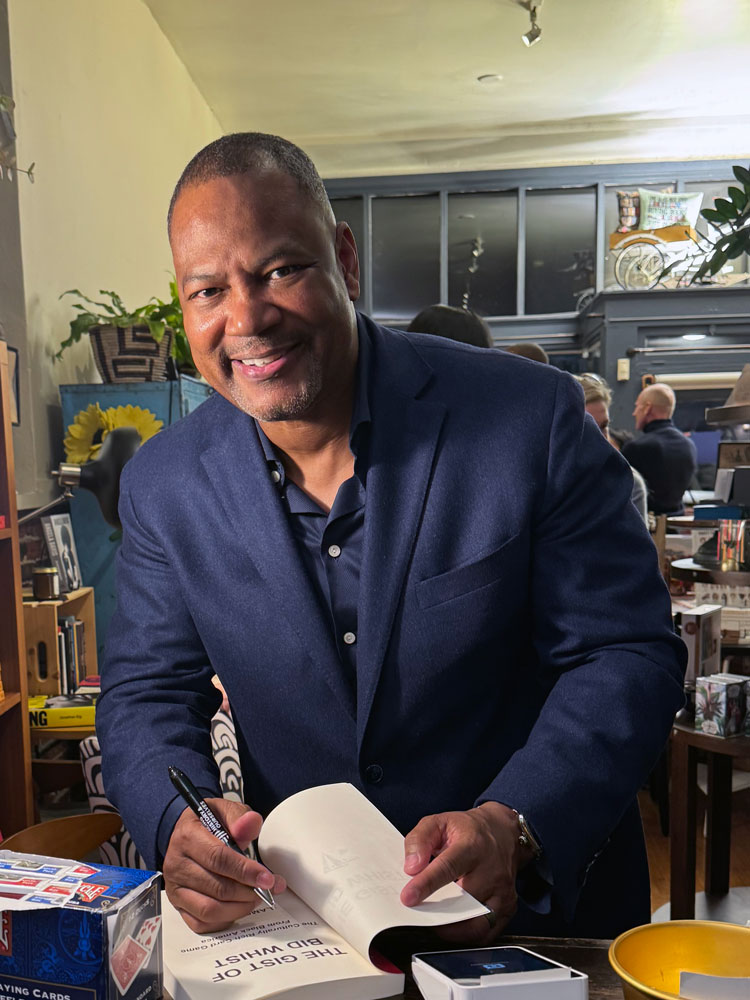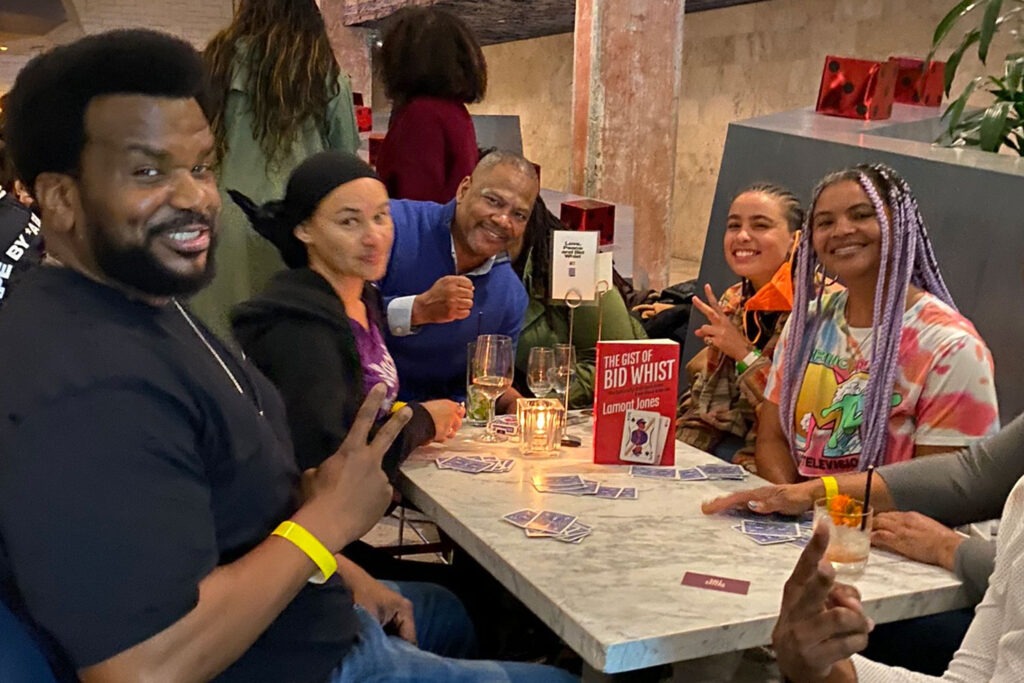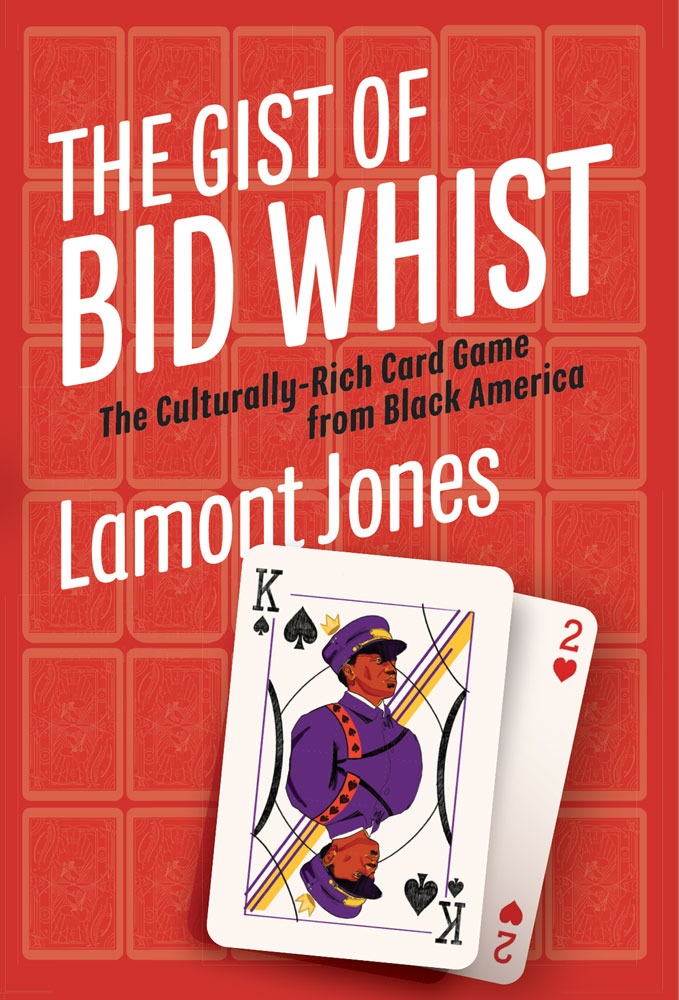
Bid whist was once called “a b-boy form of bridge” by Time magazine. The partnered bidding card game is popular in the Black community, but little known outside it. In his new book, The Gist of Bid Whist, author Lamont Jones calls our city “the spiritual home of bid whist,” because the game is played more avidly here than anywhere in America.
The Gist offers both an explanation of how to play bid whist, along with a cultural history of the game. He spoke to Chicago magazine about the game’s local roots.
Describe bid whist for people who aren’t familiar with it.
It’s a partnership game. At a certain point in time, each of the four players will lay down a card in the middle of the table. So there’ll be a small pile of four cards, that’s called a trick. And the objective is, let’s play the best card wins that trick. You’re trying to win as many tricks as you can. And the partnerships basically say, there are 13 available tricks. We’re going to win eight, then the other side might try to outdo that. So we’ll win nine of them, right? And whoever makes the biggest wager gets a chance to try to make that wager. If they don’t win enough tricks, they lose points. That gives the game its tension. That’s a big part of the strategic focus of the game. It’s like a sibling game of bridge, euchre, spades, and hearts.
Bid whist seems to be very well known in the Black community, but not at all outside. Why is that?
Within Black communities, it certainly has been well known in past generations. But my concern is that the game is headed toward a demographic cliff. Younger Black folks don’t know much about the game. A lot of them have kind of heard of it, from their parents or grandparents or whatever.
The ambition of this project is to share the game with younger Black folks, but also with people of all backgrounds who love cards. I’m trying to make a contribution to that literature. And hopefully that will have the game be better known within the Black community and outside.
How and where did you learn how to play?
My very first day of law school orientation, I met three fellows. One of them said, “Hey, you guys wanna play some cards?” I was a huge spades player; I like to play hearts. And I said, “Yeah, we can bust spades right now.” A couple of them were like, “Well, we got something that’s even better than spades.” Long story short, man, we played every day, semester after semester. I mentioned in the book that if three of us were ready to play cards, and the fourth guy was sitting in class or the library, we’d go get his ass. We need this quorum so we can conduct this bid whist business.

Why hasn’t it expanded outside the Black community?
Let me tackle really quickly why bid whist is popular within Black communities, that kind of goes to my hypothesis that Chicago should be considered the spiritual home. The Pullman porters were popular figures in Black communities — even though the job had its menial aspects — because it was like the first sort of middle class job that Black men could have. And they were also cosmopolitan because they weren’t tethered to a job in a particular location, they traveled the country. And as they’re traveling the country, they’re providing information that helped fuel the Great Migration.
One of the things that they shared on their journeys was bid whist. It was very popular among the porters. They played it on the trains, when they had layovers in different cities. So I think that explains its popularity within the Black community, as opposed to games like euchre, which is popular just sort of regionally in the Midwest. Or sheepshead, which is only played in Wisconsin. Bid whist has a sort of national presence, largely because of the Pullman porters.
Where do you play now? Why do you say Chicago is a spiritual home of bid whist?
Well, first of all, I think that Chicago has a robust bid whist scene today and yesteryear. And it’s kind of headlined by luminaries. First, I think of Michael Jordan, the impact that he had in Chicago and around the world. He’s known as a ferocious bid whist player. Last night, I played with the actor and comedian and musician Craig Robinson — proud Chicago guy. Jim Reynolds is one of my reliable bid whist partners, he’s a civic titan and investment banker. One of his playing partners is Don Thompson, the former CEO of McDonald’s.
Beyond them, Michelle Obama mentioned it in her book. I wasn’t committed to reading President Obama’s 700-page book, but I decided to read enough to find out what he had to say about bid whist or playing cards. He didn’t get to that story until page 693.
My favorite bid whist Chicago encounter involves Reverend Jesse Jackson. At an event several years ago, I said, “Hey, man, people say that you play bid whist. Is it true?” And he looks out into the distance, he says, “I lost the game of bid whist once. I was 6.” He started laughing and telling me some good news stories.
When you get all the tricks, that’s called a Boston.
You get all of the tricks, I like to say that that gives you the same psychological threshold as a slam dunk, or knockout or touchdown or homerun all rolled into one. Running the Boston is one of the highlights of the game.
Why is it called a Boston?
The word is that it comes from the Pullman porters. The longest trip is from Los Angeles all the way to Boston. So people were saying, you know, we’ll ride you all the way to Boston.
Where do you play in Chicago?
Usually at home with friends. Chicago has local bid whist chapters as well. I know people who play at supper clubs on the South Side. The Odyssey Lounge at 9942 South Torrance hosts Bid Whist Throwdowns each Thursday from 3 p.m. until about 9 p.m. Another reason Chicago should be considered the spiritual home of bid whist: There’s only been one newspaper that ran a regular bid whist column. The Chicago Sun-Times ran a weekly bid whist column back in the ’90s.
Have you seen it in movies or on TV?
Every now and then, like in the movie Rustin. They mentioned Ella Baker was a strong good whist player. I remember Just Wright with Common and Queen Latifah. Common was a basketball player. And the mom of one of the characters was like, “Does this family play bid whist?” So every now and then, you get cultural references.



